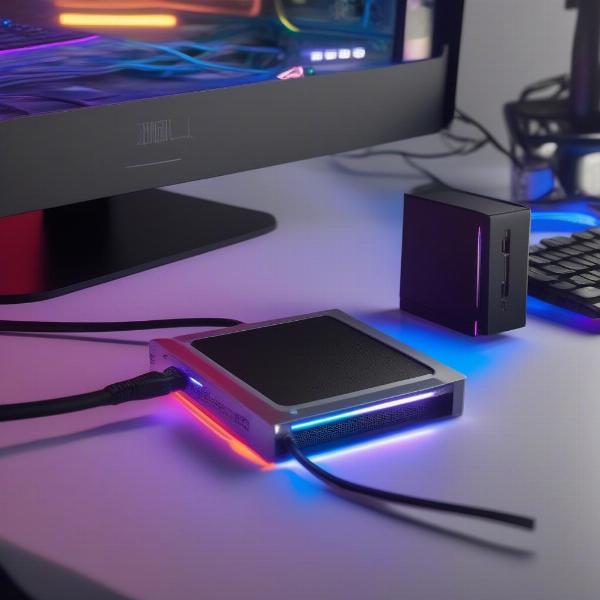Running out of space on your console or PC? Wondering if an external hard drive can solve your gaming woes? You’ve come to the right place. We’ll dive deep into the world of external game storage, covering everything from compatibility to performance.
Playing games directly from an external hard drive is absolutely possible, and for many, it’s a lifesaver. It’s a simple solution to expanding your gaming library without having to delete your favorite titles. However, there are some nuances you should be aware of before making the jump. Different platforms and game types have varying degrees of compatibility and performance considerations when using external storage. Let’s break it down.
External Hard Drives and Gaming Consoles
Modern consoles like the PlayStation 4 and 5, Xbox One, and Xbox Series X/S all support external hard drives. This feature allows you to store and play a vast collection of games without constantly managing your internal storage. But not all games are created equal. While older titles and less graphically intensive games perform well on external drives, newer, more demanding games might experience longer loading times.
For PlayStation consoles, you can even store PS5 games on an external drive, though you’ll need to transfer them to the internal SSD to play them. This is because PS5 games are optimized for the speed of the internal SSD, and an external drive wouldn’t be able to keep up. However, storing them externally frees up valuable space on your console’s internal drive. For Xbox Series X/S, optimized games for the new generation require the internal SSD or the official Seagate Expansion Card for optimal performance. You can store and play older Xbox One, Xbox 360, and original Xbox games on an external drive connected to the Series X/S.
PC Gaming and External Hard Drives
On PC, external hard drives offer a convenient way to expand your game library. You can install and play games directly from most external drives, but the drive’s speed will significantly impact performance. A standard hard disk drive (HDD) will be noticeably slower than your internal SSD, leading to longer load times and potentially some in-game stuttering. However, if you’re playing older or less demanding games, an external HDD can be a cost-effective solution.
For the best experience, consider using an external solid-state drive (SSD). While more expensive than HDDs, external SSDs offer comparable speeds to internal SSDs, minimizing load times and ensuring smooth gameplay. They’re a worthwhile investment if you prioritize performance. Similar to consoles, you can also use an external drive for storage and transfer games to your internal drive when you want to play them. This is especially handy for managing large game files. Think of it as archiving your games until you’re ready to jump back in.
 External SSD connected to Gaming PC
External SSD connected to Gaming PC
Choosing the Right External Hard Drive
Not all external hard drives are created equal. When selecting a drive for gaming, consider the following:
- Speed: SSDs are significantly faster than HDDs, resulting in shorter load times.
- Capacity: Choose a size that fits your gaming library and future needs.
- Portability: Smaller, more rugged drives are ideal for gamers on the go.
- Compatibility: Ensure the drive is compatible with your chosen platform (PC, PlayStation, Xbox).
- Connectivity: USB 3.0 or higher is recommended for optimal performance.
Remember to check your platform’s specific requirements for external hard drives. For example, some consoles require drives to be formatted in a specific way. Getting this wrong can sometimes feel similar to figuring out how to delete game ps4.
Optimizing External Hard Drive Performance
To get the best performance out of your external hard drive, consider these tips:
- Defragmentation: Regularly defragmenting your HDD can improve performance, though this is not necessary for SSDs. It’s a good habit to get into much like remembering what time do ps plus games come out.
- Connection: Use a high-quality USB cable and connect the drive directly to your console or PC. Avoid using USB hubs, as they can introduce latency.
- Cooling: Ensure the drive has adequate ventilation to prevent overheating. This can be particularly important for demanding games.
“Gamers often overlook the importance of a quality USB cable,” says John Smith, a veteran game developer. “A good cable can make a surprising difference in transfer speeds and overall performance.”
External Storage: A Game Changer
External hard drives are a valuable tool for any gamer struggling with storage limitations. Whether you’re a console or PC gamer, they offer a convenient and cost-effective way to expand your gaming horizons. By understanding the nuances of compatibility and performance, you can make the most of your external storage and enjoy a seamless gaming experience. Remember, picking the right external drive and optimizing its performance are key to maximizing your enjoyment. Some compatibility considerations are similar to understanding if do playstation 1 games work on playstation 2.
Expanding Your Gaming Universe with External Storage
Using an external hard drive to play games is a great way to manage your ever-growing game library. With the insights from this article, you’re now equipped to choose the right drive, optimize its performance, and unlock the full potential of external storage for an uninterrupted gaming experience.
FAQs
-
Can I play any game from an external hard drive? Most games can be played from an external drive, but newer, more demanding titles may perform better on internal storage, especially on consoles.
-
Is an external SSD worth the extra cost? If you prioritize speed and minimal load times, an external SSD is a worthwhile investment, particularly for PC gaming.
-
How do I format an external hard drive for my console? Refer to your console’s documentation for specific formatting instructions. This is important for compatibility.
-
Can I use the same external hard drive for both my PC and console? Yes, in many cases, but you may need to reformat the drive depending on the platform you’re using.
-
What happens if my external hard drive fails? It’s crucial to regularly back up your game data to prevent loss in case of drive failure. Consider cloud storage or a second external drive.
-
What’s the difference between USB 3.0 and USB-C for external hard drives? USB-C offers faster transfer speeds than USB 3.0, though both are suitable for gaming. Your device’s ports will dictate your options. For those wondering how to turn off game mode on mac, a similar understanding of connectivity is beneficial.
-
Can I use an external hard drive to improve the performance of older games? While an external drive can offer additional storage, it won’t inherently improve the performance of older games unless your primary drive is full and causing performance issues. The key improvement will likely be related to loading times. For optimal performance improvements for older games, consider transferring them to an internal SSD. Understanding game file verification is helpful, similar to learning how to verify game files on xbox series x.

